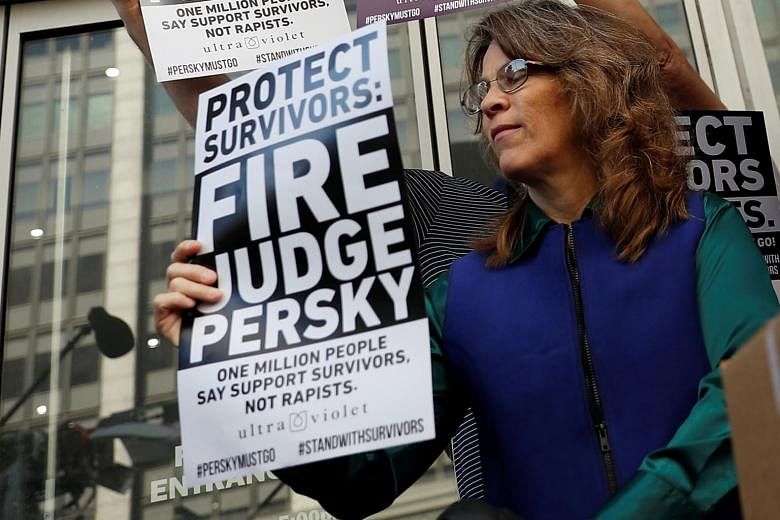A sex assault trial in the United States has ignited a nationwide discussion on the issue of rape culture on university campuses, sparking a heated debate over gender equality and white privilege.
The case of Brock Turner - Stanford student, star athlete and future orthopaedic surgeon - vs "Emily Doe", as the victim is known in local papers, sparked controversy a week ago when Turner, 20, was given his sentence for sexual assault.
He was facing a maximum of 14 years' jail after a jury found him guilty. Prosecutors were pushing for at least six years.
Instead, Turner got six months in jail and three years of probation.
The assault happened in January last year. Turner was at a fraternity party in Stanford University, and so was the 23-year-old victim, who had recently graduated from university. She was visiting her younger sister, an undergraduate at Stanford, and the two decided to go to the party.
-
Attacker: I never want to have a drop of alcohol again
-
Brock Turner, the former Stanford student who was found guilty of sexually assaulting an unconscious woman behind a dumpster, has come under even more fire for his statement submitted to Judge Aaron Persky. In it, he blamed the "party culture" and alcohol for his deed. Here is an excerpt:
"I am completely consumed by my poor judgment and ill- thought actions. There isn't a second that has gone by where I haven't regretted the course of events I took on Jan 17/18. My shell and core of who I am as a person is forever broken from this.
At this point in my life, I never want to have a drop of alcohol again. I never want to attend a social gathering that involves alcohol or any situation where people make decisions based on the substances they have consumed. I never want to experience being in a position where it will have a negative impact on my life or someone else's ever again.
All I can do from these events moving forward is by proving to everyone who I really am as a person. I know that if I were to be placed on probation, I would be able to be a benefit to society for the rest of my life.
I know I can show people who were like me the dangers of assuming what college life can be like without thinking about the consequences one would potentially have to make if one were to make the same decisions that I made.
I want to show that people's lives can be destroyed by drinking and making poor decisions while doing so. One needs to recognise the influence that peer pressure and the attitude of having to fit in can have on someone.
One decision has the potential to change your entire life. I know I can impact and change people's attitudes towards the culture surrounded by binge drinking and sexual promiscuity that protrudes through what people think is at the core of being a college student.
I want to be a voice of reason in a time where people's attitudes and preconceived notions about partying and drinking have already been established.
I want to let young people know, as I did not, that things can go from fun to ruined in just one night."
After about an hour, the victim called her boyfriend, sounding incoherent. The victim told him she "drank alcohol, too fast". She also called her sister, who had left to go to a friend's dorm. She could not remember anything after that.
About an hour later, two Swedish graduate students saw Turner on top of the victim behind a dumpster near the fraternity house. They called out to him, he ran, they gave chase and pinned him down until the police arrived. They testified at the trial, confirming that the victim was unconscious when they found her.
At the trial, Deputy District Attorney Alaleh Kianerci told the jury: "He may not look like a rapist, but he is the… face of campus sexual assault."
The leniency of the sentence has made many Americans question the message that Judge Aaron Persky was sending about consent and sexual assault, especially on campus.
Campuses across the United States do not have a good record in dealing with sexual assault cases.
According to a study last year by Brown University, more than one in every six women are raped during their first year in college - most are too drunk to fend off their attacker.
A 2014 Justice Department report found that 80 per cent of student victims do not report the sexual assault to the police. "In general, colleges and universities have done a really bad job at managing campus sexual assault - preventing it or responding to it when it occurs," said Stanford law professor Michele Dauber, according to Agence France-Presse.
If justice is not seen to have been served by the courts, even fewer will be compelled to step forward, and suffer the trauma of a trial.
Turner, his family and friends all tried to downplay his crime, shifting blame to the alcohol, the party, the victim - all of which incited even more public anger.
First was Turner's own statement, submitted to Judge Persky before the sentencing, in which he blamed universities' "party culture" and alcohol for his "poor decision-making".
Then, there was a slew of testimonials from friends and family members, all vouching for his character and insisting he was no rapist. A harsh sentence would ruin his bright future, they all argued.
His father, Mr Dan Turner, wrote a letter decrying the verdict, saying it was "a steep price to pay for 20 minutes of action".
Turner's friend, Ms Leslie Rasmussen, wrote that it was unfair "to base the fate of the next 10-plus years of his life on the decision of a girl who doesn't remember anything but the amount she drank to press charges against him".
The judge agreed. In handing out the sentence, he said Turner had "less moral culpability" as he was intoxicated, and that a prison sentence would "have a severe impact on him".
The widespread anger that ensued was not just because sexual assault was trivialised, but also because of the apparently double standards that were applied to Turner, often portrayed in the media as a star swimmer with Olympic dreams, and an ambition to be a doctor.
-
Victim: It's not about drinking, it's about sexual assault on campus
-
"Emily Doe", as the 23-year-old woman who was sexually assaulted by Stanford student Brock Turner is known in local papers, wrote a moving 7,000- word statement detailing her ordeal, addressed to her attacker. It has been read millions of times online since it was released. This week, the letter will be read out on the House of Congress floor. Here is an excerpt:
"When I was told to be prepared in case we didn't win, I said, I can't prepare for that. He was guilty the minute I woke up. No one can talk me out of the hurt he caused me. Worst of all, I was warned, because he now knows you don't remember, he is going to get to write the script. He can say whatever he wants and no one can contest it. I had no power, I had no voice, I was defenceless. My memory loss would be used against me.
Future reference, if you are confused about whether a girl can consent, see if she can speak an entire sentence. You couldn't even do that. Just one coherent string of words. If she can't do that, then no. Don't touch her, just no. Not maybe, just no. Where was the confusion? This is common sense, human decency.
Assault is not an accident. This is not a story of another drunk college hook-up with poor decision making. Somehow, you still don't get it. Somehow, you still sound confused.
You said you are in the process of establishing a programme for high school and college students in which you speak about your experience to 'speak out against the college campus drinking culture and the sexual promiscuity that goes along with that'.
Speak out against campus drinking culture. That's what we're speaking out against? You think that's what I've spent the past year fighting for?
Not awareness about campus sexual assault, or rape, or learning to recognise consent. Campus drinking culture. Down with Jack Daniels. Down with Skyy Vodka. If you want talk to high school kids about drinking, go to an AA meeting.
You realise having a drinking problem is different than drinking and then forcefully trying to have sex with someone? Show men how to respect women, not how to drink less."
His mug shot was also not released until four days after sentencing, sparking more accusations of white privilege.
The victim, in a statement submitted in court, said: "How fast Brock swims does not lessen the severity of what happened to me, and should not lessen the severity of his punishment.
"If a first-time offender from an underprivileged background was accused of three felonies and displayed no accountability for his actions other than drinking, what would his sentence be?"
The 7,000 word statement detailing her ordeal, which news website Buzzfeed obtained and published on June 3, has since gone viral and has been read millions of times.
The outpouring of overwhelming support for the victim has, in fact, shown that gender equality has advanced, despite the lenient sentence. Beyond the level of awareness of rape culture this case has raised, American society has swiftly responded by rejecting Turner's excuses, chastising those who support him, and demanding justice for Emily Doe.
At least 10 petitions are active on Change.org, including one calling for Judge Persky to be removed from the Bench - it has the support of 1.1 million people.
This week, members of Congress will read Emily Doe's statement in the House of Representatives, sealing it in the congressional records.
Turner, who has been expelled from Stanford, was on Friday banned from competitive swimming for life by USA Swimming, the governing body for the sport.
His childhood friend, Ms Rasmussen, who spoke up for him, has also felt the ripple effects - organisers cancelled gigs by her punk-rock band Good English after netizens criticised her and demanded that show producers drop her.
There may be more repercussions to come. Turner might have got just six months behind bars, but he will have to pay for his crime for life.



